Oct 22, 2009 0
No, this is not black-and-white
We went to look at the ocean last Saturday. It was about to rain, so everything was gray. This video was shot in full color, but because the sky was so gray, it looks like it’s black-and-white.
Oct 22, 2009 0
We went to look at the ocean last Saturday. It was about to rain, so everything was gray. This video was shot in full color, but because the sky was so gray, it looks like it’s black-and-white.
Oct 22, 2009 0
This week we began classroom observations. The advisory panel will visit every ETA’s school for a formal observation. We sit in the back of the classroom and watch the class. We also video the class and give the ETA a copy of the video. After the class, we give the teachers feedback.
Because the four ETAs who teach in middle school go to two different schools, we visit each of them. Eight observations plus 12 observations for the 12 ETAs who teach in elementary schools means a lot of observations. Traveling between the schools throughout the county is time-consuming, so at most we can do one observation in a morning, and one in the afternoon.
It’s great to get out of the office and into the classrooms to see the ETAs in action, but it’s a lot of work. In addition to the feedback right after the observation, I am also expected to write a formal report on each observation. Guess what I’m going to be doing for the next month?
We finished the 4th observation this morning. So far, I’m really pleased with most of what I’ve been seeing. The ETAs are working well with their local English teachers, and we’re seeing some good instruction in the classrooms. One interesting phenomenon is that when four or five adults are sitting in the back of the classroom, the children are very well-behaved. The teachers are able to teach without worrying about classroom management. As a consequence, though, they tend to finish their lessons early, and have to scramble to fill the last five minutes or so.
Oct 20, 2009 0
One reason is that his grandmother lets him do this:
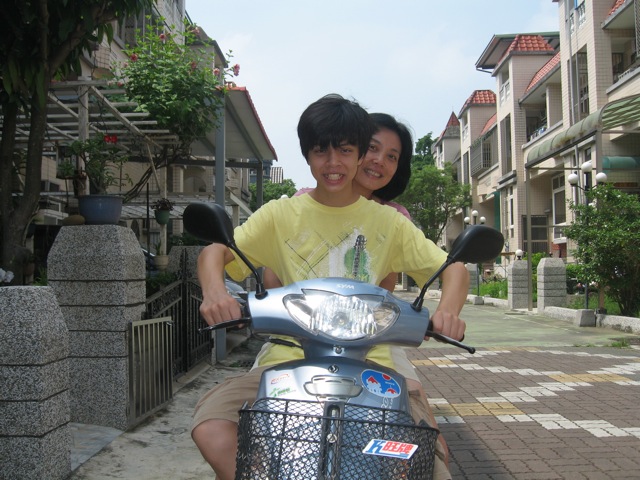
The legal driving age in Taiwan is 18, both for scooters and cars. But in the gated community where Evan’s grandparents live, we can let Evan drive.
I think this is the definition of a sh*t eating grin. 😉
Oct 12, 2009 1
On our last trip down south to Tainan å°å— to visit Stacy’s parents, Stacy’s father decided that all the grandchildren needed wristwatches, so he took them to the store and let them choose a watch.
Afterwards, Stacy had the kids pose for pictures with their watches. The boys, of course, have lots of experience in clowning for the camera. Erin got a big kick out of hanging with the older cousins and learning some new tricks.
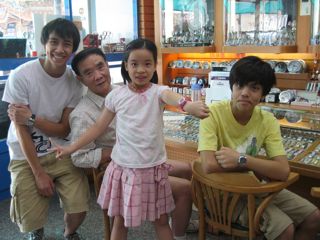
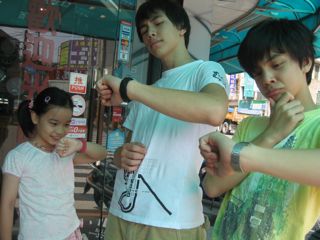
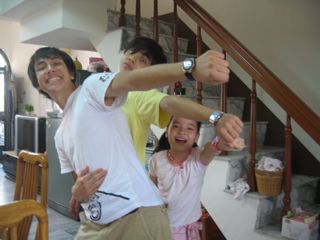
Oct 12, 2009 0
I finally learned why vitamins are so expensive in Taiwan. The government classifies vitamin supplements as a medicine, so it’s a controlled substance. A woman was caught importing vitamins from the US and selling them in Taiwan. She was tried as a drug smuggler, and found guilty! Luckily the sentence was overturned on appeal (it’s good to see that at least one judge has some common sense).
It’s funny that it’s just as hard to get vitamins in Taiwan as it is to get antibiotics in the US…
Oct 12, 2009 2
Mid-Autumn Festival ä¸ç§‹ç¯€ was originally a harvest festival in Chinese culture. Traditionally, it was a time for the family to gather and have a big meal, celebrating and giving thanks for the harvest. Sound like any particular American holiday? Modern Taiwanese celebrate the holiday with a barbecue.
After Stacy and I got the fire going, we cooked an enormous amount of food. Here we are cooking Taiwanese sausages, which are sweet and despite what my brother-in-law Chi says, are made with pork, NOT rat meat. 😀

Stacy’s mother wanted to try it, so we bought a bottle of the local grain wine from Yilan that is fermented with a special “red yeast” 紅麴. To an American’s taste buds, it’s pretty unremarkable. In order to make it taste good, you mix it with apple-flavored soda pop. I am not making this up.
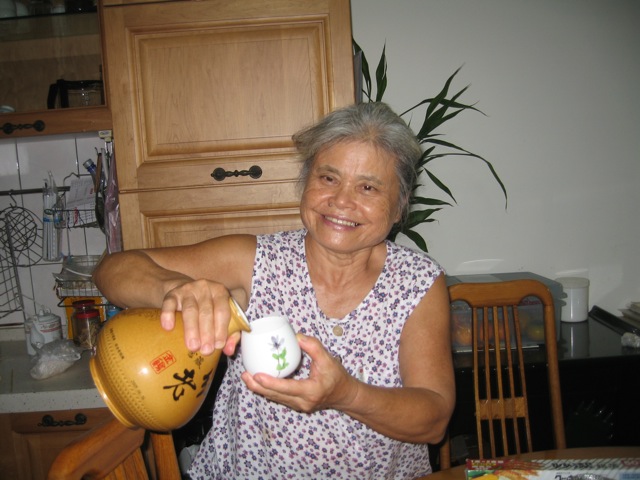
It isn’t a Hoopingarner family gathering without a little musical showing off. Which is usually the idea of the parents, by the way. We “volunteered” Evan and Ian to play some tunes. Stacy’s father had transcribed some folk songs from his childhood into Chinese musical notation, and then while the boys played on their instruments, he accompanied them on his harmonica. Stacy’s sister especially requested that Evan play the oboe, because she had never heard one close-up in person. The boys also did a little improvised jamming, which impressed the aunts and uncles.
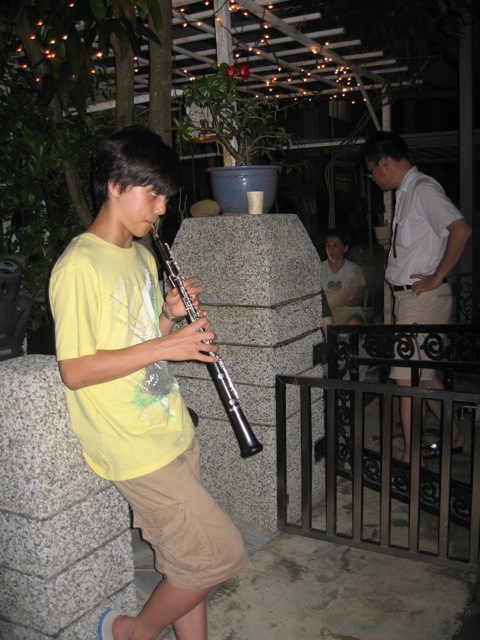
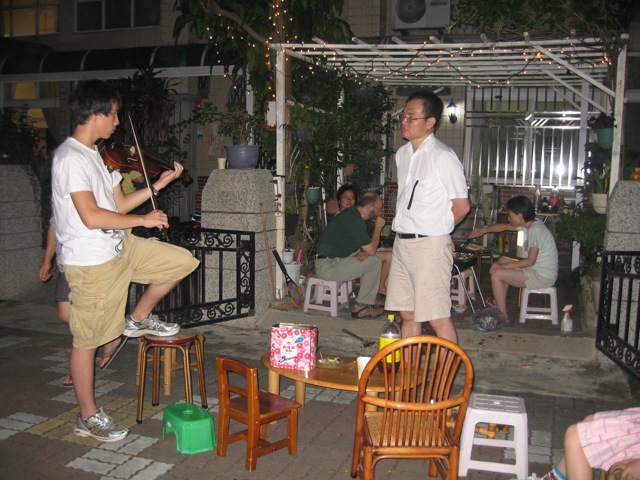
The next day we drove back to Yilan in Stacy’s brother’s car. He’s studying in Holland, and generously offered us the use of his car while we’re in Taiwan. Next post, I’ll write about the adventure of racing a typhoon from the south of the island to the north end.
Oct 6, 2009 2
Typhoon Parma clobbered Taiwan this week. This time Yilan wasn’t as lucky: we caught the brunt of it. The funny thing about this typhoon was that the damaging part wasn’t the wind, but the amount of rain. We got record amounts of rain, which caused a lot of flooding and accompanying property damage, but not a lot of damage from the wind. The kids and I got a day and half off school for “typhoon day.”
Here’s a picture of the Yilan River the day after. You can see pretty significant flooding:

Oct 6, 2009 5
Well, they ain’t nothin’ compared to the spork that I had at a noodle place on Sunday.
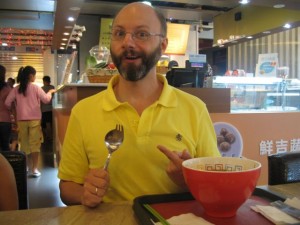
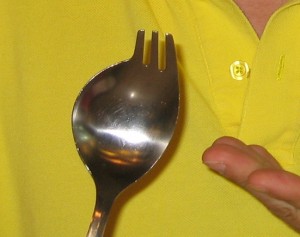
Now that’s a freakin’ spork! Stainless steel and everything! 🙂
Oct 2, 2009 0
The sister of one of our ETAs became deathly ill, and the ETA had to make the difficult decision to return to the US to spend the remaining time with her sister. I completely understand her decision, but it’s a big loss to the program. It left her school without an ETA. The local English teacher had been planning a lot of special programs and activities for the school year, with the assumption that she would have an ETA to help. Suddenly without an ETA, the teacher was quite anxious.
Luckily, an ETA from last year happened to be back in Taiwan. He was planning to study Chinese at the National Taiwan University å°å¤§, but agreed to come back to the program for a second year. He stepped in as a replacement ETA for the year. We only lost about two weeks of continuity of the program in that school.
It seems that there are a lot more problems and situations this year compared to last year. An ETA lost his wallet, which held his Alien Resident Card, insurance card, and other important information. Another ETA is having personality clashes with the staff at the ETA’s school. There are other small problems with the apartments, working conditions, and other small issues.
I feel a bit bad about this, even though it isn’t my fault. I don’t want to the program to be causing problems for the county. Maybe problems are inevitable, and even though it seems that there is always something to take care of, we can always take care of it. Maybe this is just what the program is like: cleaning up one mess after another. Sort of like parenting.
Anyway, the ETA who returned to the US is planning to return next year and complete the program with the next year’s cohort. Everything should work out (knock on wood).
Oct 2, 2009 1
Yilan County’s education department decided that every school in the county needs a SMARTBoard. For those who don’t know what a SMARTBoard is, it’s a special white screen that is touch-sensitive. You can control the computer by touching the screen. In addition to clicking and dragging, you can also write on the board with virtual pens. There are lots of other functions of the technology, such as the ability to save a marked-up screen as a graphic file to a USB flash drive. There are many educational applications of SMARTboards.
Last week, I sat in on a workshop for classroom teachers, which was intended to prepare teachers to use the technology effectively. The workshop covered very general topics such as effective teaching with technology, and gradually led up to specific tips and examples of using SMARTboards in the classroom. The workshop was five days long, and featured guest speakers from across the county.
It was interesting to see professional development in Taiwan, and reflect on the the similarities and differences between Taiwan the US. Unfortunately, the boring parts of workshops (listening to an academic speak from the ivory tower) are just as prevalent in Taiwan. Teachers want practical information that they can take back to their classrooms the next day. Academics want to explore the theory behind the practical.
During the theoretical discussions, the teachers in the workshop were doodling on their papers or nodding off. During the practical demonstrations, the teachers wanted to get copies of the Powerpoint files and games that the presenter was showing. It was so much like a workshop presentation in the US, that if the workshop had been in English instead of Chinese, an American teacher would have felt right at home.